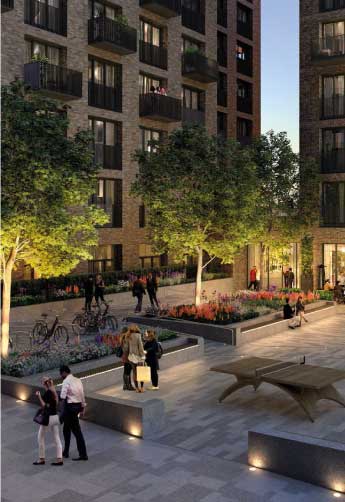Are you excited about buying your new London home but unsure of the steps you need to take?
This general guide takes you through the practicalities and legal steps you will go through when buying your new London home.
Understanding the buying process
We understand that buying a new home can be a lengthy and confusing process. That’s why we have put together this simple checklist to guide you through the process of purchasing your new London home.
INITIAL STAGES OF RESERVATION
Reservation submitted with Krypton Global Investments sales team
Once the purchase has been agreed and the reservation form has been completed, the reservation form will then be sent to all parties.
Reservation fee paid
Within 24 hours of reserving, you are required to pay your reservation fee*.
Individual identity documents
You will need to provide the following documents of the named purchasers in order to comply with the anti-money laundering requirements.
Certified valid Photographic Identification for each named purchaser. Documents to be dated within the last 3 months.
Certified proof of address for each named purchaser
Instruct finance provider (where applicable)
If you are buying your new home with a mortgage, you will need to instruct a mortgage broker or your bank.
Instruct your solicitor
Formally instruct your solicitor to act on your behalf and complete the relevant paperwork.
Pay money to your solicitor (to be placed on account)
Your solicitor will request funds to be placed on account for disbursements and searches.
Legal Pack sent to your solicitor
At this stage, the developer’s solicitor will send you a draft contract with a copy of the title and lease (where applicable) and any other relevant files.
Your solicitor will then carry out the necessary due diligence required for the sale.
AFTER RESERVATION
LEGAL
Solicitor will carry out required searches related to your purchase
Solicitor will raise enquiries with the developer’s solicitor
Draft contract finalised
Purchaser review of contracts and title documents
FINANCIAL
Please note that the further financial steps may only be applicable for homes where mortgage offers are available prior to exchange of contracts and/or valid on completion.
Full mortgage application submitted to a lender
Valuation/survey booked
Valuation/report received
Mortgage offer received
EXCHANGE OF CONTRACTS
Contract signed and returned to the solicitor
Initial deposit transferred to the solicitor
Exchange of contracts
On exchange of contracts, a binding contract is in place.
When a home is being purchased off-plan then a buyer will usually exchange contracts with completion on notice.
If a home is ready to move into then it may be possible to set a completion date on an exchange of contacts.
*The reservation form, fee and identity documents will need to be submitted within 24 hours to confirm your reservation.
What does a conveyancer or solicitor do?
It is possible for you to handle the process of buying your home yourself. However, it is complicated and without expert knowledge and experience, there is the risk that you may get something wrong. Most people use a conveyancer or solicitor to do all of the necessary work for them.
Conveyancing is the legal transfer of ownership of a property (in this case a new home from the developer to you) and it is usually done by solicitors or licensed conveyancers. It can involve:
Carrying out local authority and Land Registry searches.
Organising property surveys (although your mortgage lender may do this for you).
Exchanging contracts and legally completing the sale.
Which solicitor or conveyancer should you use?
Using a solicitor or conveyancer that someone has recommended will give you confidence that they will do a good job.
We work with a panel of experienced solicitors and conveyancers and would be happy to recommend one to you.
What you need to do
While your solicitor handles the conveyancing, there are other things that you may need to organise.
INSURANCE FOR YOUR NEW HOME
Buildings insurance covers your new home against fire, flood and storm damage. Mortgage lenders usually want to see that you have arranged buildings insurance from the date of Legal Completion.
Contents insurance covers the contents of your home against fire, flood and theft. Mortgage lenders don’t usually need you to have this, but it’s very sensible for your own protection.
You should also think about having personal insurance in case your circumstances change.
What is the exchange of contract?
Before exchange of contracts, your solicitor will carry out a great deal of administrative work.
THE DRAFT CONTRACT
The developer’s solicitor will draft a contract that you will eventually need to sign. Your solicitor will check that the price, deposit amount, and the title deeds (the registered property and ownership details) in the contract are all correct.
They will then send you a copy of the draft contract for you to read. The draft contract may include:
A property information form, which gives key property information.
Copies of previous ownership documents (title deeds).
A fixtures, fittings and contents form.
What happens between exchange and legal completion?
There is still work for your solicitor to do after contracts have been exchanged.
They will carry out final searches such as Land Registry checks.
They will draft a transfer document to transfer the ownership of the property to you.
They will finalise your mortgage documents and arrange for you to sign them.
They will make sure that the mortgage funds are available to complete the sale.
What is the legal completion?
This means that you become the owner of your new London home – congratulations!
Legal completion takes place after the exchange of contracts and when your new home is ready to move into. Sometimes exchange and completion happen on the same day, but more often they are a week or two apart.
What happens on the day of legal completion?
Your mortgage lender releases the money to pay for your new home.
You pay other costs, such as Stamp Duty and solicitor’s fees.
Your Conveyancer or solicitor receives the title deeds for the home.
Your Conveyancer or solicitor registers the transfer of ownership of the home with the Land Registry.
We will meet you and hand over the keys so you can move into your new home!
For further advice please contact our sales team
Email: [email protected]
Share now
Share on facebook
Share on twitter
Share on linkedin
Share on whatsapp
Share on email







